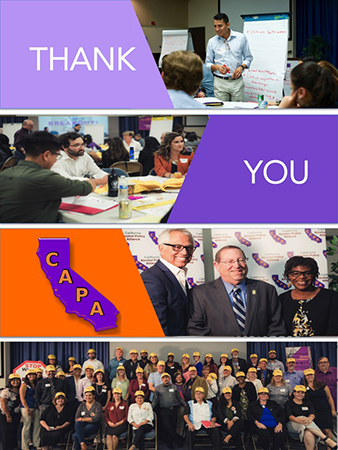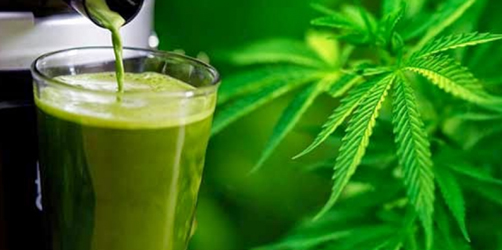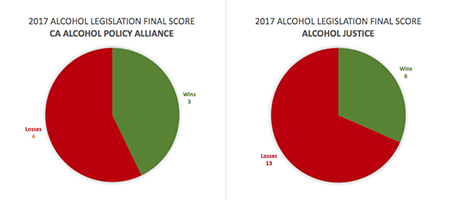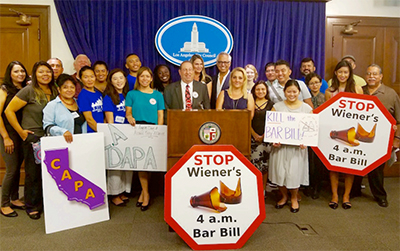Blog
CAPA 2nd Annual Summit a Success
 Thanks to all our members!
Thanks to all our members!
Over 100 alcohol prevention allies from across the state gathered in Los Angeles on September 18th for the 2nd Annual CAPA Summit to celebrate their victory over the 4 am Bar Bill and plan for the coming year. We were joined by keynote speaker, Jacob Appelsmith, Director of Alcoholic Beverage Control, and LA City Council Member Paul Koretz. Alcohol Prevention Heroes honored included Assembly Member Raul Bocanegra (D-39). ABC PIO John Carr, Lynne Goodwin of Friday Night Live Partnership and Jaime Rich of Center for Human Development.
Thanks to all who made the day one of spirit and energy -- we look making CAPA even stronger in the year to come.
Big Alcohol Lunges to Take Over Cannabis
 Public health advocates face a complicated question: how can marijuana’s growing acceptance as a recreational and medical product be reconciled with the potential for a powerful pot industry to engage in the kinds of reckless, corrupt, and manipulative practices Big Alcohol has mastered? Constellation Brands, the owner of Corona beer and Svedka vodka among other brands, offers an easy answer: with their purchase of a 10% stake in Canopy Growth, they declare Big Alcohol’s intention to be the marijuana industry.
Public health advocates face a complicated question: how can marijuana’s growing acceptance as a recreational and medical product be reconciled with the potential for a powerful pot industry to engage in the kinds of reckless, corrupt, and manipulative practices Big Alcohol has mastered? Constellation Brands, the owner of Corona beer and Svedka vodka among other brands, offers an easy answer: with their purchase of a 10% stake in Canopy Growth, they declare Big Alcohol’s intention to be the marijuana industry.
With Monday’s (10/30/17) $191 billion dollar investment in the Canadian marijuana producer Canopy, Constellation has declared its intention to get out in front of the legalization of recreational marijuana in Canada and the U.S. “Our company’s success is the result of our focus on identifying early-stage consumer trends, and this is another step in that direction,” Constellation CEO Rob Sands told Bloomberg Businessweek.
What that means seems still up for debate, even among the business partners themselves. Bruce Linton, the CEO of Canopy—which makes medicinal marijuana products for the Canadian market—reassured Bloomberg that “[t]here’s no need to include alcohol, nor is there an intent to include alcohol” in their products. Yet Constellation told Beer Business Daily (subscription required), “There are going to be alcoholic beverages that also contain cannabis.”
This presents multiple problems both for public health advocates and independent marijuana producers. The resources of Big Alcohol, compared to those of marijuana companies, are vast, including access to lobbyists and the ability to distort public health research. While Canopy currently works in a regulated medical marijuana space, once full legalization passes, Big Alcohol’s expertise in tearing down safety regulations, promoting junk science, and marketing to youth will introduce a raft of health problems that negate the benefits of prescription weed.
“The alcohol companies are somewhat terrified of this industry,” a rival marijuana executive told Bloomberg. “They see cannabis as a substitute for alcohol.” Data on chronic marijuana use are scant, so it remains unclear whether long-term marijuana use is better for the public health, but this buyout makes that issue moot: if Big Alcohol holds the marijuana industry’s reins, cannabis has zero chance of mitigating alcohol-related harms.
This buyout could signal the start of a race to the bottom among marijuana companies. MolsonCoors and Diageo both told Bloomberg in a separate article they are anticipating entering the marijuana industry, and their entry will instantly create Big Marijuana and gut independent growers that don’t enjoy such partnerships.
“Big Alcohol is what happens when you fail at regulating a recreational drug company,” said Michael Scippa, Public Relations Director of Alcohol Justice. “We can’t allow Big Marijuana to become something similar—and we really can’t let them be the exact same companies.”
READ MORE about how California’s marijuana regulators must not make the same mistakes we made with alcohol.
2017 California Alcohol Legislation Wrapup
 As the 2017 legislative session wraps up, prevention advocates celebrate a handful of key victories—most notably, the defeat of SB 384, Scott Weiner's reckless 4 a.m. last call bill. But alcohol legislation remains a pressing concern, both in terms of promoting public safety and preventing reckless giveaways to Big Alcohol.
As the 2017 legislative session wraps up, prevention advocates celebrate a handful of key victories—most notably, the defeat of SB 384, Scott Weiner's reckless 4 a.m. last call bill. But alcohol legislation remains a pressing concern, both in terms of promoting public safety and preventing reckless giveaways to Big Alcohol.
The following bills were of particular import to Alcohol Justice and the California Alcohol Policy Alliance. "Win" means AJ/CAPA supported the bill and it passed, or opposed the bill and it failed. "Loss" means a supported bill failed, or an opposed one passed.
2017 final scores
AJ: 6 wins, 13 losses
CAPA: 3 wins, 4 losses
In addition, the legislature sometimes reserves the right to revisit bills that stalled in committee in the following year. These two-year bills are listed at the end.
Assembly Bills
AB 63 vetoed
Extends the age range for provisional drivers' licenses from 16 to 21.
AJ and CAPA supported—provisional licenses as part of a Graduated Driver Licensing program are effective at reducing underage drunk driving.
LOSS
AB 297 signed into law
Authorizes alcohol sales at a wine and cultural museum in Sonoma County.
AJ opposed—if a venue needs a special permit, by definition it is in an area that is overconcentrated with alcohol outlets. New licenses should be issued according to best practices, not on a haphazard, case-by-case basis.
AB 400 signed into law
Allows alcohol sales at pre-ticketed State Capitol events intended to raise awareness of the food and wine of the Sacramento region.
AJ opposed—this bill gives the appearance that the Legislature is favoring the alcohol industry over public health.
LOSS
AB 471 signed into law
Allows the City of San Francisco to add 30 alcohol licenses (5 per year over 6 years), restricted to specific neighborhoods.
AJ opposed—San Francisco is already the most overconcentrated county in California. Rather than reassign existing licenses to spread outlets out across the city, this bill simply shoehorns in even more.
LOSS
AB 479 dead
Increases the tax rate on distilled spirits and uses that revenue to eliminate taxes on women's health and hygiene products.
AJ supported—raising alcohol taxes is a time-honored means to reduce alcohol harm.
LOSS
AB 522 signed into law
Allows nonprofits to receive special temporary licenses in order to hold raffles involving wine or beer.
AJ opposed—alcohol company in-kind donations to nonprofits are a growing and problematic trend, giving the industry free marketing and a positive veneer while costing them less than an outright cash donation.
LOSS
AB 609 signed into law
Extends an exemption to certain activities allowing licensees to provide free distilled spirits or wine to consumers at invitation-only sales or distribution events.
AJ opposed—this perpetuates the permeation of alcohol into all parts of the waking day.
LOSS
AB 711 signed into law
Allows beer manufacturers to provide free or discounted rides through taxis and ride-sharing services.
AJ and CAPA opposed—while free rides for people who would drive dangerously is a good thing, these promotions are delivered before the fact—rather than help address acutely intoxicated would-be drivers, they normal overconsumption and encourage recipients to go out and drink dangerously.
LOSS
AB 997 signed into law
Allows patrons of wineries and/or breweries that are physically adjacent to bring alcohol from one onto the grounds of the other.
AJ opposes—alcohol sellers are supposed to be aware of how much they are serving their patrons. This bill vastly compounds the difficulty of that task.
LOSS
AB 1046 dead
Classifies soju or shochu of 24% ABV or less as a wine.
AJ opposed—these are very high ABV, nearly tasteless "wines" that are most often used as a cocktail base. This bill lets any distilled spirit producers sell their product at qualifying wine-licensed outlets just by labeling it soju/shochu.
WIN
AB 1054 dead
Exempts the use of "palcohol" (powdered alcohol) for certain uses in "nonpowdered products".
AJ and CAPA opposed—this bill tears holes in last year's palcohol ban.
WIN
AB 1221 signed into law
Establishes a statewide Responsible Beverage Service training program for California, requiring that all on-sale retailers complete the training. Provides both an overview of state laws and regulations and of the physiological effects of alcohol.
AJ supported—individuals at points-of-sale can play a key role in reducing the harms from alcohol overconsumption. Moreover, these trainings help ensure staff follow existing laws.
WIN
AB 1722 signed into law
End prohibition on the issuance of a license, other than an on-sale beer license, for premises situated more than one mile outside the limits of an incorporated city and within 2 miles of any camp or establishment of men, numbering 25 or more, engaged upon or in connection with the construction, repair, or operation of any work, improvement, or utility of a public or quasi-public character.
AJ and CAPA opposed—this was an opaque bill that changed form several times. In the end, however, it increases the number of alcohol outlets, and that will always have a negative impact on public health.
LOSS
Senate Bills
SB 65 signed into law
Makes driving, boating, or flying while drinking an alcoholic beverage punishable as an infraction.
AJ and CAPA support—this is a common-sense intervention aimed at reducing drinking and driving (or drinking and boating, or drinking and flying).
WIN
SB 228 signed into law
Allows beer on the grounds of a public schoolhouse if it is part of an instructional program in brewing.
AJ opposed—public schoolhouses are primarily intended for the education of children. Allowing alcohol on premises promotes the product and normalizes its consumption. In addition, this bill makes no effort to include public health and safety or RBS training as part of a curriculum directly involving tasting and making alcoholic beverages.
LOSS
SB 384 dead
Allows local jurisdictions to extend last-call times in bars and restaurants to 4 a.m.
AJ and CAPA opposed—our positions have been made clear elsewhere. Suffice to say that pushing back last-call times creates a more dangerous driving environment; stresses already overtaxed emergency and law enforcement systems; merges early-morning commuter traffic and late-night partier traffic; and creates a lasting environment of overconsumption in a state that has yet to establish a consistent, comprehensive late-night transit plan in any city.
WIN, but this bill will absolutely come back
SB 461 signed into law
Extends a loophole allowing distilled spirit shippers to own certain hotel and motel on-sale stores.
AJ opposed—this extends an existing violation of tied-house laws. Liquor manufacturers should not own on-sale establishments.
LOSS
SB 582 signed into law
signed into law
Allows for the alcohol industry to purchase advertising space in the new Los Angeles Chargers football stadium, as well as the adjacent performance venue.
AJ and CAPA opposed—alcohol permeates the sports world, and sports advertising is a prime channel for delivering alcohol advertising to kids. Moreover, this bill would allow manufacturers to purchase space from or for on-sale locations, in clear violation of the three-tier system.
LOSS
SB 611 signed into law
Improves on 2016's legislation requiring ignition interlock devices for individuals convicted of certain forms of driving under the influence.
AJ supported—these laws improve on ignition interlock devices, a smart idea for preventing DUI.
WIN
SB 664 signed into law
Allows alcohol manufacturers to purchase advertising on behalf of on-sale licensees at AT&T Park in San Francisco and the Chargers' stadium in Inglewood.
AJ opposed—as with SB 582, sports advertising gives the alcohol industry unfettered access to an underage audience. Moreover, it violates the three-tier system.
LOSS
Two-Year Bills
These bills will be revisited by the legislature in 2018.
AB 330
Authorizes the court to order a person convicted of driving under the influence to enroll and participate in, and successfully complete, a qualified “24/7 Sobriety” monitoring program during probation.
AJ supported
AB 629
Allows art galleries to give away wine or beer to patrons.
AJ and CAPA opposed—like last year's dry-bar bill, this would put alcohol in more places where it doesn't need to be. Gallery employees would be furnishing alcohol without any licensing, training, monitoring, or enforcement. The likelihood that this would lead to underage drinkers getting access to alcohol is close to 100%.
SB 254
Allows for companies to deliver alcohol and tobacco, if licensed by ABC.
AJ opposed unless amended—home delivery of alcohol and tobacco is dangerous and depressing, but it already occurs in California. This bill does not specify how delivery personnel will be trained, how age will be verified, limits on time of delivery. Enforcement would be very difficult, a major problem in California's current "easier to ask for forgiveness than permission" business culture.
SB 378
Enhances ABC's ability to investigates violations and take action—including suspending licenses—against alcohol sellers on conditions of imminent threats to health and safety.
AJ and CAPA supported—ABC neeeds greater authority in bringing action against problem retailers. However, the list of threats to health and safety should be extended to include illegal alcohol sales.
NOTE: Although SB 384, the 4 A.M. bar bill, was gutted and amended and no longer has a bill number, its sponsor, Sen. Scott Weiner (D-San Francisco) has threatened to revive it in the second year of this session. Though this proposal flies in the face of legislative tradition, we take his threat seriously and urge all allies to remain vigilant. Check alcoholjustice.org for news, updates, and action alerts.
SIGN UP to receive newsletters and action alerts (enter email at top left-hand corner).
READ MORE about alcohol legislation in California and the U.S.
California’s 4 A.M. Last Call Bill 86’d for Now
Public health & safety grassroots advocacy trumps nightlife industry’s push for greater profit.
 SAN FRANCISCO, CA (September 22, 2017) – California Alcohol Policy Alliance (CAPA), and Alcohol Justice are breathing a hard-fought sigh of relief as the 2017 California legislative session draws to a close because at least one bill was notably, and mercifully, absent—the 4 A.M. Bar Bill.
SAN FRANCISCO, CA (September 22, 2017) – California Alcohol Policy Alliance (CAPA), and Alcohol Justice are breathing a hard-fought sigh of relief as the 2017 California legislative session draws to a close because at least one bill was notably, and mercifully, absent—the 4 A.M. Bar Bill.
State Sen. Scott Wiener's SB 384 was a dangerous piece of legislation that would have striped away the standard protections of a normal 2 a.m. closing time. But by the time the bill hit the Assembly floor it had been completely gutted and recast as a bill seeking to reform the state sex offender registry. All reference to the hazardous, entertainment-industry-backed assault on public health and safety laws was gone. It appears that for at least a few more years, bars will close at their normal time.
Even for a bill that seemed destined to be the apple of Big Alcohol’s eye, SB 384 was shrouded in controversy. A resurrection of a failed bill from 2013, SB 384 drew the ire of local health, prevention, and recovery groups as well as MADD and law enforcement organizations that rallied at every opportunity to express strong opposition. They drew the attention and support of a steadily growing chorus of elected representatives, determined to call out the damage their constituents would suffer from an ostensible “local control” bill. Their voices were heard.
Then there were SB 384 supporters’ missteps. Sen. Wiener (D-San Francisco) first tried to compare the opportunity to party late to the struggle of African American communities, appropriating the slogan “Night Life Matters.” He then reinforced the tone deaf approach with red-herring arguments that a 4 a.m. last call could’ve prevented the Ghost Ship tragedy.
With the help of shoddy science and a flurry of amendments that were hidden from the public until well after the bill was voted on, Wiener ushered SB 384 through the State Senate and the Assembly GO Committee. However, it would go no further as the 4 A.M. Bar Bill.
“While Senator Wiener did a masterful job in the Senate at pulling the wool over his colleagues’ eyes, he ran into the truth in the Assembly Appropriations Committee,” said Jorge Castillo, spokesperson for the Los Angeles Drug and Alcohol Policy Alliance. “His denial of peer reviewed research on increasing alcohol-related harm and his constant crowing about the virtually worthless ‘local control’ process were finally challenged.”
The end came in two steps. First, the bill was held up in the Assembly Appropriations committee. The committee had real concerns over its projected costs—both in terms of government spending and lives lost—and dramatically reshaped it into a task force intended to study the long-term effects of state-sanctioned early-morning drinking.
“Smart minds prevailed … in the Assembly Appropriations Committee as SB 384 was gutted, and gutted well for very good reasons,” said Richard Zaldivar, Executive Director of The Wall Las Memorias Project and Chair of CAPA. “That bill was bad for California residents, their public health, and public safety. The people of California won.”
Next, possibly alarmed by what a new task force could find, or possibly deciding he had more urgent legislative priorities, Sen. Wiener then withdrew all alcohol-related language from the bill (he later told the San Francisco Chronicle, “There is nothing to study”); the gutted-and-amended SB 384, now addressing problems with the sex offender registry, passed both chambers.
Unfortunately, the end for the bill this year does not mean the end for the struggle to contain alcohol harm. Speaking to the San Francisco Chronicle, Wiener said he was, “…not giving up on this bill. We are going to bring the bill back next year and limit it only to cities… that want the ability to make the change.” According to Wiener those cities are San Francisco, West Hollywood, Long Beach, Oakland, and Sacramento.
“That’s just ridiculous,” said Bruce Lee Livingston, Executive Director/CEO of Alcohol Justice. “California cities aren’t islands. Dangerous driving, assault, fatigue, and health problems will have no problems crossing city limits into every neighboring community.”
In those respects, then, Sen. Wiener is partially right: in this era of rampant deregulation, Alcohol Justice and the California Alcohol Policy Alliance do not need a new study to know they need to fight to keep common-sense public health protections in place, including a uniform, normal, statewide 2 a.m. last call.
More Articles ...
Help us hold Big Alcohol accountable for the harm its products cause.
| GET ACTION ALERTS AND eNEWS |
STAY CONNECTED    |
CONTACT US 24 Belvedere St. San Rafael, CA 94901 415-456-5692 |
SUPPORT US Terms of Service & Privacy Policy |


